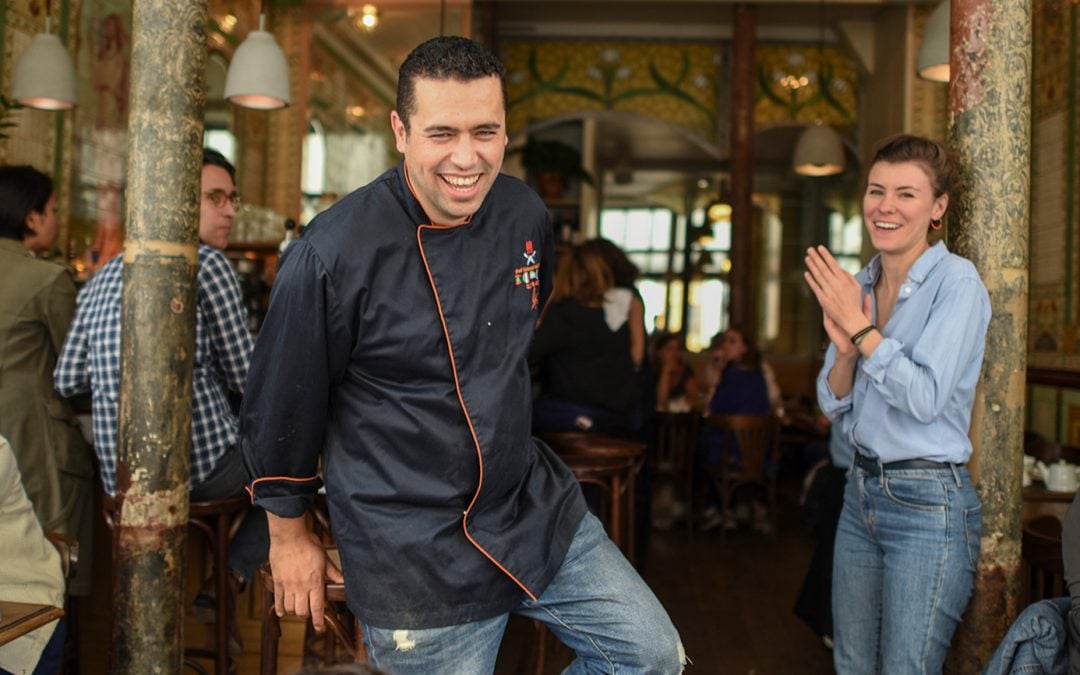In France, a great number of citizen-led initiatives popped up, where ordinary people were willing to contribute and take meaningful action to welcome refugees. These new initiatives encompassed everything from helping refugees to learn French, accessing higher education and professional training, promoting their talents, facilitating their access to employment, but also accommodating them in private homes, and creating connections.
At the UNHCR Office in Paris, as of August 2015, we received calls every day from citizens, schools, local associations, and municipalities willing to help and asking precisely how they could do just that.
This was the context in which, one day, Marine and Louis, who had created the NGO Food Sweet Food, arrived at UNHCR Office in Paris. Marine and Louis wanted to utilize their expertise and passion for food and cuisine to change how people see refugees in addition to helping newcomers integrate in France. In a city famous for its cuisine, they wanted to harness the skills of refugee chefs and bring them to Parisian restaurants. They had an idea: to connect Parisian restaurants and refugees by asking them to open their kitchens to refugee chefs for the World Refugee Day.
This is how the Refugee Food Festival was born.
Food: a common connection
Marine and Louis traveled to 18 countries within the past 3 years where they were cooking with local people in their homes and communities. This transformational project convinced them that food is a fantastic way to create connections, to share, and discover each other.
In the context of France, food is also a meaningful way to bring host communities and refugees together. Sharing a meal is a way to connect with someone new and to understand their story. This is even more true in a country like France where cuisine is so important for the population, regardless of their age. Moreover, French cuisine has always been inspired by tastes and flavors from abroad. Restaurants are also an opportunity for access to employment in Paris. It is an area where there are jobs available and in which innovation is possible. We saw the dots connecting around refugees and food, and we eager to collaborate on this challenge.
For us, the Refugee Food Festival was a new type of citizen response.
It was the first time Parisian restaurants were opening their kitchen to refugee chefs and changing their menus for the occasion. Asking Parisians restaurants to change their menus is in itself disruptive. The project was aimed at not only eating well (which is of course, important!) but utilizing cuisine as a vehicle for changing the perception of refugees and helping integration, a very serious and sometimes controversial subject.
A unique partnership between the City of Paris, UNHCR, citizens, and Food Sweet Food
Innovation is about bringing together people with unique expertise around a specific challenge, and the Refugee Food Festival did just that.
The Refugee Food Festival brought together partners and people from various horizons to welcome refugees to the city of Paris.
We had mobilized citizens, local authorities, NGOs, restaurants, UNHCR, and of course refugees to create a shared experience around the festival.
Each partner had a role and area of expertise to contribute to the development of this project, its success, and ultimate impact. From the UNHCR Paris office identifying refugee chefs and creating links with local authorities, to Food Sweet Food’s expertise in managing events around culture and food, and to the restaurants willing to support the social good initiatives – collaboration was at the heart of the Refugee Food Festival.
Food Sweet Food was critical in understanding how the event would work, UNHCR brought its expertise and experience in refugee protection. The partnership was a recipe for creating social good in a new context.
From 17 to 21 June 2016, 11 restaurants in Paris opened their kitchen to 8 refugee chefs from Syria, Sri Lanka, Chechnya, Ivory Coast Iran and India for the first Edition of Refugee Food Festival.
The participating restaurants were Le Freegan Pony, la Mano, Poulette, Inaro, le Petit Bain, les Marmites Volantes, l’Ami Jean, Bespoke, West Country Girl, Atelier Kialatok & Indonesia. The restaurants’ profiles were really diverse with a gastronomic restaurant, a participative canteen, a cocktail bar, a cooking workshop, a wine bar, a French bistro, and a neighborhood address. The idea was to create a festival accessible to all budgets and tastes.
The restaurants either put their kitchen in the hands of refugee chefs and changed the menu accordingly, or the two chefs cooked hand in hand and invented new recipes together. At the local creperie called West Country Girl, clients could eat Indian dosas with typical garniture from Bretagne or crepes with typical garniture from India. Diners were so eager to try concepts from the festival that there were lines consistently queuing for a table.
More than 1.000 people came to eat in the restaurants during the Festival.
Lessons learned and challenges with the prototype festival
The first event was a success. Restaurants were booked days in advance, the cuisine was delicious, and the diners were thrilled to discover new cuisine. But more importantly, it changed the way local citizens were seeing refugees, created understanding and connections, and a new mobilization for welcoming refugees in the city.
The Refugee Food Festival reinvented traditional French cuisine, with new ideas and flavors from around the world. The refugee chefs received standing ovations in the restaurants and an opportunity to continue their livelihood with access to employment. Nine months after the initial event, all the chefs who participated in the festival are now working at least on a temporary contract in Paris food scene. The festival proved to be a major stepping stone in their culinary career in France by triggering concrete and exciting job opportunities.
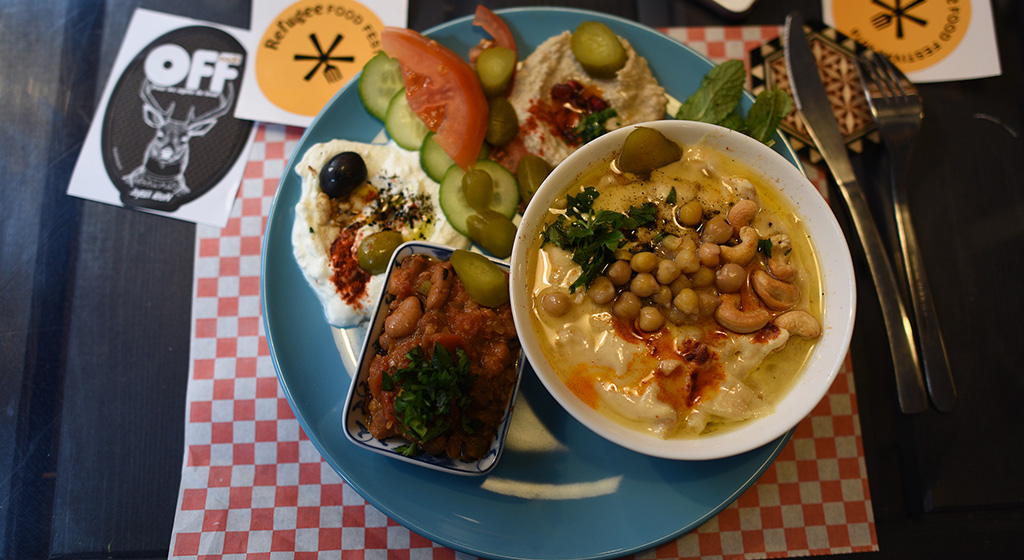
The Cafe con Leche restaurant opened its kitchen to the Syrian refugee chef, Hussami. Hussami’s prepared Syrian brunch and a gouter for citizens during the festival. © UNHCR/Benjamin Loyseau
The Festival also mobilized and brought together a wide range of partners around the same goal: solidarity and facilitating the integration of refugees. All of us who participated were moved by the response. In the following months, public and private organizations expressed their will to get involved in the project by mobilizing refugee chefs for their events, including Kenzo – one of the greatest Parisian fashion house, who asked the Refugee Food Festival team to set-up the dinner for the launch of its new collection during the fashion week in Paris. Quai Branly Museum – Jacques Chirac prestigious museum, le Consulat – a trendy ephemerid party and art workspace or la fête de l’Humanité – a festival with 600 000 attendees, designed culinary proposals with chefs from the Refugee Food Festival.
“I feel home when I cook, I feel my family, I feel my grandmother when she cooked. It deeply takes me back to our country when I was a kid. It is a good way for me to discover new friends, especially for me it’s a new culture, a new country, it’s a new language, it’s a new people so the food makes you smile and food makes you learn more and more and that makes me find myself when I cook.” said Enad, Syrian Chef of the Refugee Food Festival.
The Paris edition of the Festival created interest from citizens in other cities in France, in Europe, and around the world. The impact was even bigger than we initially expected. We realized the large potential of the project, not only to change the way people see refugees but also to facilitate refugees’ access to employment.
We understood that there was a need to think and develop some components of the project even further, especially the need to give more opportunities and time for the connection between the refugee chefs and the diners. The team wanted to use this new momentum to explain the global context for refugees and take the opportunity of the Festival to explain the situation of refugees worldwide to the clients.
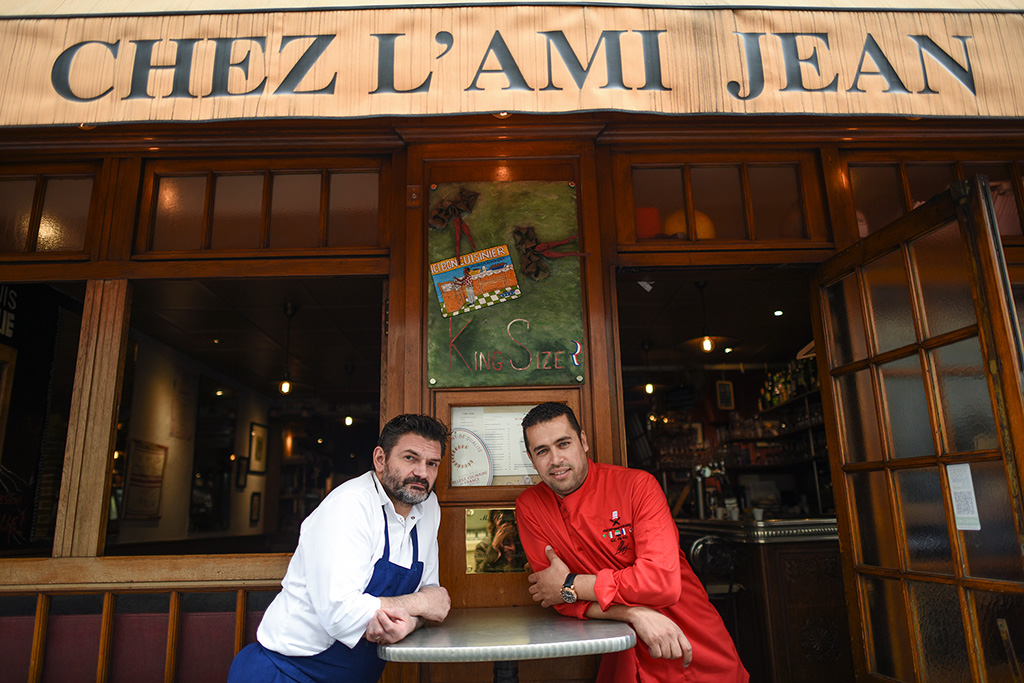
Syrian chef Mohammad El Khaldy was one of many refugees sharing their culture and cuisine with Parisians. © UNHCR/Benjamin Loyseau
It became apparent that there was the need to reply to the requests of citizens willing to organize the Refugee Food Festival in other cities in France, and globally.
After identifying this new challenge, we made the decision to create a How-To guide on how to organize the Refugee Food Festival and empower new citizens to recreate the project. Through the initial launch of the pilot, we knew we also needed a space to highlight the amazing talents of refugee chefs and to connect them with restaurants. This initial idea took the form of an online platform to create connections between both parties and help refugees access employment in restaurants all in one digital website.
Expanding an innovative idea and refugee inclusion
A second edition of the Refugee Food Festival has been organized for Christmas in Strasbourg, the capital of the European Parliament. The objectives of this second edition was to test the How-To guide and to announce a European Refugee Food Festival for 2017 World Refugee Day. We had a dedicated project coordinator, and a passionate citizen based in Strasbourg that would not only identify the restaurants but introduce refugee chefs to the restaurants and manage the organization of the Festival.
A total of 1,500 people participated in the second edition of the Refugee Food Festival. Restaurants were booked weeks in advance and there were some restaurants who ultimately had to turn down hundreds of reservations. Two weeks prior to the second launch of the Festival, we had a chalet with cuisine from Afghanistan and Tibet located at the Strasbourg Christmas market, the largest Christmas market in Europe. We used this opportunity to communicate about the Festival, distribute flyers, engage media, and reply to questions about the refugee context worldwide.
The Festival was supported by the City of Strasbourg and they were able to amplify the event leading up to the launch. The city officials were actively engaged throughout the process, and used the opportunity to reaffirm Strasbourg as a city that welcomes and supports the refugee population.
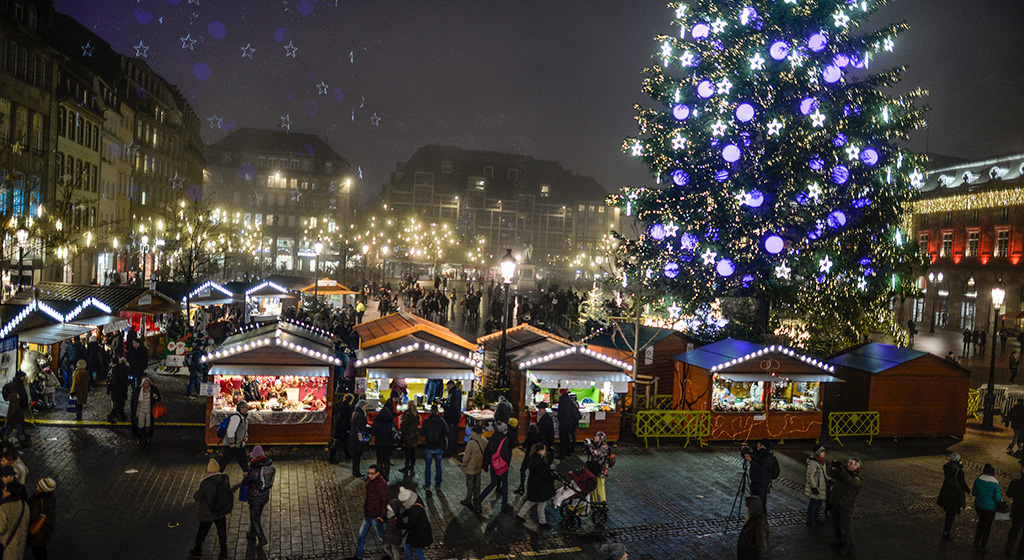
The Refugee Food Festival event, organized by Food Sweet Food and the UN Refugee Agency (UNHCR), aims – through the universal power of food – to change the way we look at refugees, while also allowing people to indulge in tasty treats.
© UNHCR/Benjamin Loyseau
As for Paris, Strasbourg proved to be successful not only in raising awareness but also in triggering concrete job opportunities for the chefs of the festival: the involvement of the restaurants continued after the festival, mainly to help refugee chefs find a job. The restaurant managers and owners shared their CVs and recommended the refugee chefs during the monthly meeting of Strasbourg restaurant owners (like a trade union of restaurants). One of the chefs is currently in the recruitment process of the prestigious Sofitel of Strasbourg and another started in March a trial of 15 days in one of the participating restaurants. Besides, a restaurant and two chefs of the festival decided to set-up a catering service company (the project is currently under development).
Opening the idea to more countries and citizens
The open-source How-To guide on the organization of a Refugee Food Festival was developed using the tools, tips, and lessons learned from the organization of the Paris and Strasbourg editions of the Festival. The guide is aimed for every citizen who wants to organize a Refugee Food Festival and gives practical steps to make it successful. Citizens will have the opportunity to submit their proposal to the Refugee Food Festival and receive the official branding and support of the team.
Inputs from restaurants, chefs, clients, refugees, and partners were used to develop the guide. We also identified a Syrian refugee to design the toolkit and contribute more extensively to the guide. The toolkit will be available initially in French and English.
The online platform to empower the refugee chefs is still in the process of being developed and will hopefully launch officially in the coming month. The platform will aim to accelerate the professional integration of the chefs of the festivals by connecting them to hiring restaurants and to organizations willing to design culinary events with refugee chefs. It will be the online component of the festivals, to gather a community of restaurants, refugee chefs, citizens and organizations engaged in breaking stereotypes, one plate at a time.
A European-wide movement for inclusivity, diversity, and welcoming refugees
The project is born from an initiative by citizens in their city and has been amplified by the partnership with other actors, all contributing in their area of expertise. It has also created interest and engagement in other cities in France, Europe, and worldwide.
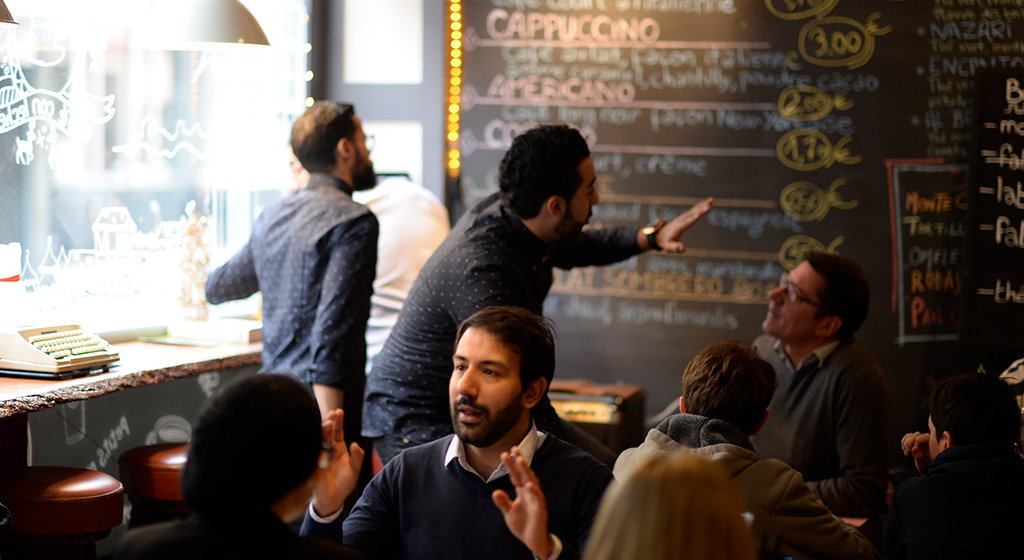
Between December 19th and 23rd, five restaurants in Strasbourg are opening their kitchens to refugee chefs for the second edition of the Refugee Food Festival following the success of the Refugee Food Festival in Paris in June 2015. © UNHCR/Benjamin Loyseau
The next phase of the Refugee Food Festival will be launched in June 2017, just in time for World Refugee Day. The 10 cities will include Paris and 4 other cities in France and 5 cities in other countries in Europe, creating a European-wide movement for inclusivity, diversity, and welcoming refugees. We’ve had requests from across five continents on how citizens can bring the Refugee Food Festival to their own cities. It’s our hope that the toolkit and open-source platform will be the catalyst for additional initiatives to be recreated, whether in Brazil, Nairobi, Beirut or New York. And it is our vision that through these Festivals people will not only enjoy great food – but highlight the plight of refugees and create new opportunities to welcome them.
Are you interested in organizing your own Refugee Food Festival? Stay up to date on the launch of the toolkit and all other related activities here: http://www.refugeefoodfestival.com
You can also follow us on social media:
https://www.facebook.com/RefugeeFoodFestival/
https://twitter.com/RefugeeFoodFest
We’re always looking for great stories, ideas, and opinions on innovations that are led by or create impact for refugees. If you have one to share with us send us an email at [email protected]
If you’d like to repost this article on your website, please see our reposting policy.

